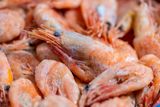A shipment of frozen shrimp imported from Indonesia has been recalled by the U.S. Food and Drug Administration (FDA) due to the detection of elevated levels of cesium-137 (Cs-137), a radioactive isotope. While the radiation levels are low, the FDA has taken precautionary measures to ensure consumer safety.
Customs and Border Protection intercepted the shrimp upon arrival, where tests revealed approximately 68 becquerels per kilogram (Bq/kg) of Cs-137. Although this level is significantly below the FDA’s safety cutoff of 1,200 Bq/kg, it was enough to prompt the agency’s intervention. The recalled products had not reached U.S. grocery stores, as the batch was flagged before distribution.
Understanding Cesium-137 and Its Risks
Cs-137 is a byproduct of nuclear fission, a process that powers nuclear reactors and weapons. It is not a naturally occurring element but has been introduced into the environment through decades of nuclear testing and accidents. As a result, trace amounts of Cs-137 can be found in soil, air, and water worldwide.
When ingested, Cs-137 behaves similarly to potassium and accumulates in soft tissues, emitting gamma and beta radiation. In high doses, this radiation can damage DNA, increasing the risk of mutations and cancer. Acute radiation sickness can result from extreme exposures, exemplified by incidents following major nuclear accidents. The half-life of Cs-137 is approximately 30 years, meaning it remains detectable in the environment long after its initial introduction.
While most food contains Cs-137 at levels that pose no risk, the shrimp in question exceeded expected thresholds for normal consumption.
Comparative Analysis of Radiation Levels
The FDA’s findings indicate that the shrimp contained 68 Bq/kg of Cs-137, a level that is unusual compared to typical seafood. For context, a banana emits a similar level of radioactivity due to its natural potassium-40 content, but one would need to consume around 100 bananas to match the daily background radiation exposure typical in the United States.
The shrimp’s Cs-137 level was approximately 100 times higher than the typical trace levels found in seafood from the Pacific, where remnants from historical nuclear testing persist. Although the detected level does not present an immediate health hazard, regulatory agencies prefer to minimize exposure to manmade isotopes, especially since cumulative exposure over time may heighten cancer risk.
For consumers who may have purchased imported shrimp, the FDA recommends checking lot numbers for products from the recalled batch and advises discarding any items that fall under this classification. If there are concerns about potential exposure, consulting a healthcare provider is advisable.
Ongoing monitoring of imported seafood continues to ensure that contaminated products do not enter the consumer market. The swift action taken by Customs and Border Protection and the FDA illustrates the commitment to food safety and public health.
This article is intended for informational purposes only and does not constitute medical advice.
For further reading on food safety, consider exploring guidelines on avoiding food-borne illnesses or the risks associated with various food contaminants.







































































